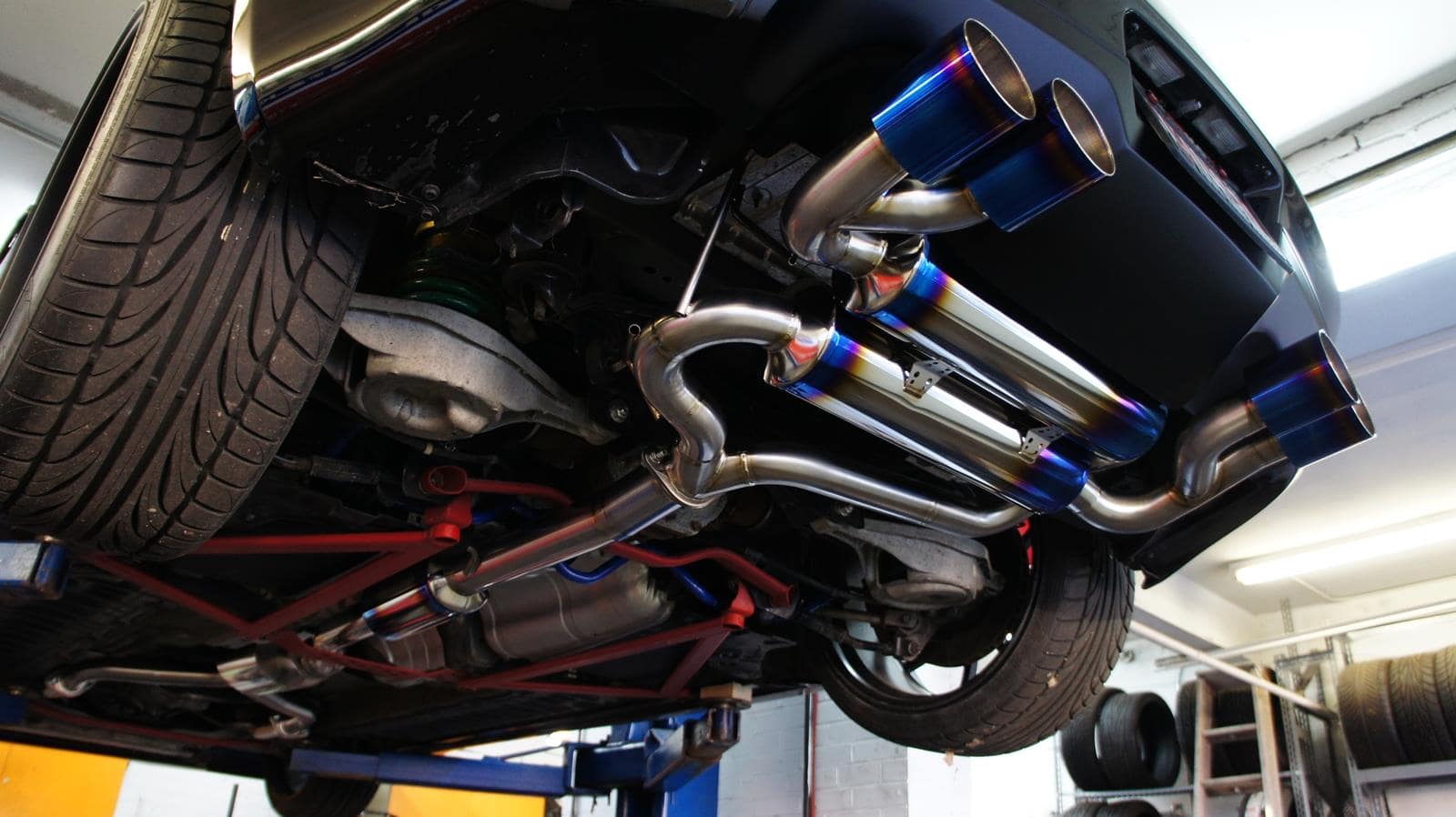Are you tired of the roaring sound your car’s exhaust system makes? Does it feel like your vehicle is announcing its presence to the world, even before you arrive? If so, you’re in the right place. In this guide, we will explore the art of fixing a loud exhaust and restoring peace and tranquility to your driving experience.
A loud exhaust can be a nuisance, not just for the driver but for everyone around. It can lead to unwanted attention, disturbance, and even legal troubles in certain areas. Fortunately, there are effective solutions available to help you restore your vehicle’s quiet elegance. Whether you’re a DIY enthusiast or someone who prefers leaving the job to the professionals, this guide will provide you with valuable insights and step-by-step instructions to tackle the issue. So, buckle up and get ready to dive into the world of exhaust systems and discover how to fix that beastly noise once and for all.
How to Fix a Loud Exhaust:
- Identify the source of the noise by inspecting the exhaust system for any visible damage.
- If there is a leak or hole, patch it up with a muffler repair kit or visit a mechanic for a professional fix.
- Check if the exhaust is loose or misaligned, and tighten or realign it as needed.
- Replace worn-out or damaged components such as the muffler, exhaust pipe, or catalytic converter.
- If the issue persists, consult a professional mechanic for further diagnosis and repair.
 Source: ytimg.com
Source: ytimg.com
How to Fix a Loud Exhaust
Is your car’s exhaust system making loud and unpleasant noises? Don’t worry, fixing a loud exhaust can be easier than you think. In this article, we will provide you with step-by-step instructions on how to silence that noisy exhaust and get your car running smoothly again.
Step 1: Diagnose the Problem
The first step in fixing a loud exhaust is to identify the root cause of the noise. There can be several reasons why your exhaust is making a racket, such as a damaged muffler, a loose or broken exhaust pipe, or a faulty catalytic converter. Inspect your exhaust system thoroughly to determine the exact source of the noise.
If you notice any visible damage or leaks, such as holes or cracks in the muffler or pipe, it is likely the cause of the loud exhaust. However, if everything looks intact, the issue might be with the internal components of the exhaust system.
Step 2: Tighten or Replace Loose Parts
If you find any loose connections or damaged parts, it’s essential to address them promptly. Start by tightening any loose clamps or bolts that are holding the exhaust components together. Sometimes, a simple tightening can fix the noise issue.
If tightening doesn’t solve the problem, you may need to replace the damaged components. This could involve replacing the muffler, the exhaust pipe, or any other faulty parts. Make sure to use the appropriate tools and follow the manufacturer’s instructions when replacing these components.
Step 3: Check the Catalytic Converter
The catalytic converter plays a crucial role in reducing noise and emissions. If you suspect that the loud exhaust is caused by a faulty catalytic converter, it’s important to have it inspected by a professional. They can determine if the converter needs to be repaired or replaced.
Keep in mind that tampering with or removing the catalytic converter is illegal in many areas due to environmental regulations. Therefore, it’s best to consult with an expert to ensure compliance with local laws and regulations.
Step 4: Seek Professional Help
If you’ve followed the above steps and the loud exhaust issue persists, it’s time to seek professional assistance. A qualified mechanic will have the necessary expertise and equipment to diagnose and fix complex exhaust problems.
Remember, a loud exhaust not only affects the comfort of your ride but can also indicate underlying issues that could impact the performance and efficiency of your vehicle. Don’t delay in getting it fixed to prevent further damage and ensure a quieter and smoother driving experience.
Conclusion
In conclusion, fixing a loud exhaust requires identifying the problem, tightening or replacing loose parts, checking the catalytic converter, and seeking professional help if needed. By following these steps, you can address the noise issue and enjoy a quieter and more enjoyable driving experience. Remember to prioritize safety and consult with professionals when necessary.
Frequently Asked Questions
Here are some common questions about how to fix a loud exhaust:
Q: Why is my exhaust system making loud noises?
There are several reasons why your exhaust system may be making loud noises. One possibility is that there is a hole or leak in the exhaust pipe or muffler. This can cause the exhaust gases to escape at a higher volume, resulting in louder noises. Another potential cause is a problem with the exhaust system’s components, such as a damaged catalytic converter or faulty muffler. Additionally, a loose or damaged exhaust pipe can also lead to increased noise. It’s important to identify the exact cause of the noise in order to effectively fix the issue.

Q: Can I fix a loud exhaust myself?
Depending on the cause of the loud exhaust, it is possible to fix it yourself. If the issue is a small hole or leak in the exhaust pipe or muffler, you may be able to use a patch or sealant designed for this purpose to repair it. However, if the problem is more complex, such as a faulty component or a damaged catalytic converter, it is recommended to seek the assistance of a professional mechanic. They will have the necessary knowledge and tools to properly diagnose and fix the issue.
Q: How much does it cost to fix a loud exhaust?
The cost of fixing a loud exhaust can vary depending on the specific issue and the type of vehicle you have. For minor repairs such as patching a small hole or fixing a loose exhaust pipe, the cost can be relatively low, ranging from $50 to $200. However, if the problem requires replacing a component such as a muffler or catalytic converter, the cost can be higher, ranging from $500 to $1,500 or more. It is always recommended to get a quote from a trusted mechanic to have a better idea of the specific cost for your situation.
Q: How can I prevent my exhaust system from getting loud again?
To prevent your exhaust system from getting loud again, it is important to perform regular maintenance and inspections. This includes checking for any signs of damage or leaks in the exhaust system, as well as ensuring that all components are securely fastened. It is also important to avoid driving over rough terrain or hitting obstacles that can cause damage to the exhaust system. Additionally, following the manufacturer’s recommended service intervals and using high-quality parts can also help prolong the life of your exhaust system and prevent loud noises.
Q: Are there any safety concerns with a loud exhaust?
While a loud exhaust may not pose an immediate safety risk, there are a few potential concerns to consider. First, a loud exhaust can be a sign of an underlying issue with the exhaust system, such as a leak or a faulty component. These issues can affect the performance of your vehicle and may lead to other problems if left unaddressed. Additionally, a loud exhaust can be a nuisance to you and others around you, as it can be disruptive and potentially violate noise regulations in certain areas. It is important to address any loud exhaust issues to ensure the proper functioning of your vehicle and to avoid any potential legal or noise-related issues.

Source: carfromjapan.com
How To Fix A Loud 3-Inch Exhaust
Conclusion
Addressing a loud exhaust is not only essential for the health of your vehicle, but also for the well-being of your community and the environment. By understanding the common causes and potential solutions for a loud exhaust, you can take proactive steps to rectify the issue and restore your vehicle’s optimal performance. Remember to prioritize regular maintenance, inspect and replace worn-out components, and seek professional help when necessary. By doing so, you’ll not only enjoy a quieter ride, but also contribute to a quieter and more sustainable world.
In addition, it’s worth noting that fixing a loud exhaust goes beyond simple noise reduction. It is a responsible choice that reflects your commitment to being a considerate driver and a responsible member of your community. By taking the necessary steps to address a loud exhaust, you are demonstrating your respect for noise pollution regulations and the health and well-being of those around you. So, do not delay any further – take action today and make the necessary repairs to enjoy a smoother, quieter, and more environmentally friendly driving experience.
